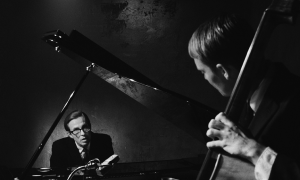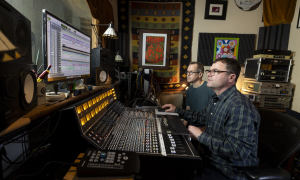Coming on the heels of the Sweet Baby James reissue by Audio Fidelity, the outfit that releases limited edition remastered versions of classic rock albums, is the widely celebrated debut album by Crosby, Stills and Nash. Going back about a year earlier than Taylor's breakthrough record, Crosby, Stills & Nash also signaled a shift away from the harsher, heavier sound of the late 60s and helped establish the template for lighter, more melodic fare that dominated rock for much of the 70s.
One of rock's first supergroups has also been one of the most successful ones, despite David Crosby, Stephen Stills and Graham Nash never being able to match the heights of their first album. That is, any album credited to “Crosby, Stills and Nash." But, boy, what a debut. This record captured the three at the peak of their songwriting powers, guys whose average work exceeds the quality of many a rock composers' best work. That isn't to say every single song on Crosby, Stills & Nash is a classic, but the magic emanating from these sessions make it feel like every cut is, anyway.
Instrumentally, this is a Stills record; he played everything save for rhythm guitar by Crosby and drums by Dallas Taylor. Though Stills is a highly skilled guitarist, his organ and bass work are also notably top notch on these songs and the production from all three stand the test of time due to avoidance of any clutter getting in the way of the songs and a superb mixing job. All this makes way for the dual star attractions: those voices, and those songs.
There aren't many extended suites in rock that become staples on the radio, but “Suite: Judy Blue Eyes" is arguably the best of 'em all. Stepping back from familiarity, it's a pretty daring song, what with Stills managing to sting together these disparate sections in a coherent way. The glue used to make it all stick together is the flawless harmonies. The next two tracks proceed to show off the abilities of the other two guys: Nash's “Marrakesh Express" is an earlier example of his charming pop sensibilities and Crosby's “Guinevere" (finally correctly spelled with one “n") is dark, moody and enigmatic due to it's strange tuning and its wandering tempo. Politically-driven rockers like “Wooden Ships" and “Long Time Gone" served notice that CSN wasn't going to be content falling back on soft, romantic folk songs every time out. The edginess and angst from these songs might get a little self-righteous at times, but they're still great tunes.
For my money, the purest beauty on this album full of beauts is Stills' “Helplessly Hoping," (YouTube below) which have the full harmonies nearly all the way through accompanied only by a single acoustic guitar. As the three move through Stills' cleverly crafted series of adverbs/verbs (helplessly hoping/wordlessly watching/heartlessly helping), they stay in perfect sync through all the delicate phrasing.
For the fourth time since the mid 80s, Crosby, Stills & Nash has been reissued on compact disk. I can't really speak for the prior three issues, but for the latest one, released on December 13, Audio Fidelity's remastering, done by Steve Hoffman, wisely makes only discreet modulations to the original recordings and keeps that warm analog sound intact. Mostly, you get a bit more separation, so the various guitars and organ swirling about on “Wooden Ships" are easily distinguishable from each other. Mainly though, the individual voices that make up the most distinctive three-part harmonies in all of rock are even easier to pick apart, making you appreciate even more how these disparate voices come together to create a single definitive voice that never gets old.
One of rock's first supergroups has also been one of the most successful ones, despite David Crosby, Stephen Stills and Graham Nash never being able to match the heights of their first album. That is, any album credited to “Crosby, Stills and Nash." But, boy, what a debut. This record captured the three at the peak of their songwriting powers, guys whose average work exceeds the quality of many a rock composers' best work. That isn't to say every single song on Crosby, Stills & Nash is a classic, but the magic emanating from these sessions make it feel like every cut is, anyway.
Instrumentally, this is a Stills record; he played everything save for rhythm guitar by Crosby and drums by Dallas Taylor. Though Stills is a highly skilled guitarist, his organ and bass work are also notably top notch on these songs and the production from all three stand the test of time due to avoidance of any clutter getting in the way of the songs and a superb mixing job. All this makes way for the dual star attractions: those voices, and those songs.
There aren't many extended suites in rock that become staples on the radio, but “Suite: Judy Blue Eyes" is arguably the best of 'em all. Stepping back from familiarity, it's a pretty daring song, what with Stills managing to sting together these disparate sections in a coherent way. The glue used to make it all stick together is the flawless harmonies. The next two tracks proceed to show off the abilities of the other two guys: Nash's “Marrakesh Express" is an earlier example of his charming pop sensibilities and Crosby's “Guinevere" (finally correctly spelled with one “n") is dark, moody and enigmatic due to it's strange tuning and its wandering tempo. Politically-driven rockers like “Wooden Ships" and “Long Time Gone" served notice that CSN wasn't going to be content falling back on soft, romantic folk songs every time out. The edginess and angst from these songs might get a little self-righteous at times, but they're still great tunes.
For my money, the purest beauty on this album full of beauts is Stills' “Helplessly Hoping," (YouTube below) which have the full harmonies nearly all the way through accompanied only by a single acoustic guitar. As the three move through Stills' cleverly crafted series of adverbs/verbs (helplessly hoping/wordlessly watching/heartlessly helping), they stay in perfect sync through all the delicate phrasing.
For the fourth time since the mid 80s, Crosby, Stills & Nash has been reissued on compact disk. I can't really speak for the prior three issues, but for the latest one, released on December 13, Audio Fidelity's remastering, done by Steve Hoffman, wisely makes only discreet modulations to the original recordings and keeps that warm analog sound intact. Mostly, you get a bit more separation, so the various guitars and organ swirling about on “Wooden Ships" are easily distinguishable from each other. Mainly though, the individual voices that make up the most distinctive three-part harmonies in all of rock are even easier to pick apart, making you appreciate even more how these disparate voices come together to create a single definitive voice that never gets old.
























